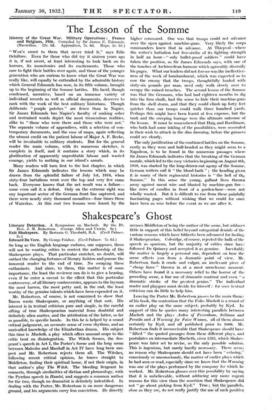The Lesson of the Somme
History of the Great War. Military Operations ; France and Belgium, 1916. Compiled by Sir James E. Edmonds. (Macmillan. .12s. 8d. Appendices, 7s. 6d. Maps, 5s. Gat) " Wan's sweet to them that never tried it," says Edie Ochiltree. Even for those Who did try it sixteen years ago it is, if not sweet, at least interesting to look back on its horrors, its monotonies and its excitements. Those who care to fight their battles over again, and those of the younger generation who are curious to know what the Great War was -really like, will equally be enthralled by the admirable history which General Edmonds has now, in its fifth volume, brought up to the beginning of the Somme battles. His lucid, though condensed, narrative, based on an immense variety of • individual' records as well as official documents, deserves to rank with the work of the best military 'historians. Though deliberate " purple patches " are fewer than in Napier, Sir James Edmonds has Napier's faculty of making sober and restrained words depict the most tremendous realities, alike to " those who were there and thoSe who were not." The separate volume of appendices, with a selection of con- temporary documents, and the case of maps, again reflecting the utmost credit on the patient labour of Major A. F. Becke, will be invaluable to military students. But for the general reader the main volume, with its numerous sketches, is complete in itself, and it contains a story which, in its glorification of apparently unprofitable labour and wasted courage, yields to nothing in our island's annals.
Many readers will turn first to the last chapter, in which Sir James Edmonds indicates the lessons which may be drawn from the. splendid failure of July 1st, 1916, when sixty-four battalions went over the top and very few came back. Everyone knows that the net result was a failure— some even call it a defeat. Only on the extreme right was any important sector of the German front line captured, and there were nearly sixty thousand casualties—four times those of Waterloo. At this cost two lesson's were learnt by the
higher command. One was that troops could not advance over the open against machine-guns. Very•likely the corps commanders knew that in advance. At Thiepval—where the writer's battalion lost five-sixths of its fighting strength in half an hour—" only bullet-proof' soldiers" could have taken the positiOn, as Sir James Edmonds says, with one of the touches of Archimedean humour which agreeably diversify his pages. What our leaders did not foresee was the ineffective- ness of the week of bombardment, which was expected so to cow the enemy that the troops, thoughtfully loaded with sixty-six pounds per man, need only walk slowly over to occupy the ruined trenches. The second lesson of the Somme was that the Germans, who had had eighteen months to dig into the firm chalk, had the sense to hide their machine-guns Bonn the shell storm, and that they could climb up forty feet quicker than our troops could walk three hundred yards. Perhaps this might have been learnt at less expense, but the tank and the creeping barrage were the ultimate outcome of the lesson. It must be remembered that Haig and Raviiimgm, who both had some inkling of the possibilities, were overruled in their wish to attack in the dim dawning, before the gunners could see clearly.
The only justification of the continued battles on the So lllll costly as they were and bull-headed as they Might seem to a Napoleon, is to be found in the numerous passages where Sir James Edmonds indicates that the breaking of the German morale, which led to the easy victories beginning on August 8th, 1918, was started by the long-drawn-out agony of the Somme. German writers call it " the blood-bath " ; the heading given it in many of their regimental histories is " the hell of the Somme." In this sense the young, gallant lives thrown away against uncut wire and blasted by machine-gun tire— like rows of candles in front of a garden-hose—were not wholly wasted. But it is difficult to rise front these painfully fascinating pages without wishing that we could for once have been as wise before the event as we are after it.




































 Previous page
Previous page